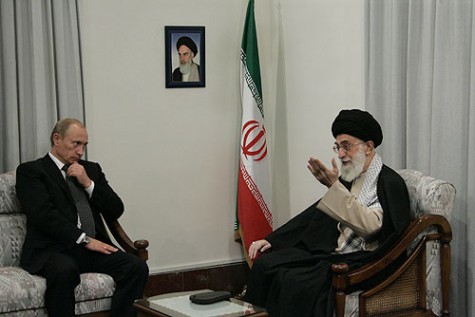The Massive Mess in the Middle East
The United States has been involved in Middle Eastern warfare and politics for a number of years, and recent developments and turmoil have led to the need for an explanation of some of the complex international relations there.
Part 1: Israel and Palestine
Israel and Palestine, two small countries in the Middle Eastern region of the world, have been dueling over territory, national rights, and a whole host of other issues for quite some time; recently, those conflicts have produced spurts of extreme violence between their respective populations. There have been a number of reported stabbings and shootings, as well as damage dealt to multiple revered holy sites. Clashes between Israeli and Palestinian security forces are also an ongoing issue, the BBC reports. The major issue at hand this time, however, could be perceived as political and religious overtones of the conflicts, rather than the violence itself.
The accusations by Palestinian leaders of this ideological shift stems largely from debate over the use of the Al Aqsa Mosque compound in the Old City of Jerusalem and partly in response to a recent attack of arson on a holy site called Joseph’s Tomb. According to the New York Times, Palestinians have accused Israeli authorities of attempting to alter a 1967 agreement regulating access and prayer restrictions—non-Muslims are not permitted to pray there, although they may visit. Israeli police forces and Palestinian youth have engaged in numerous skirmishes at the Mosque recently, and the violence has begun to alarm even typical allies of Israel. King Abdullah II of Jordan issued a rare warning, and a White House statement of Vice President Joe Biden encouraged restraint by both sides involved in the violence.

The Al Aqsa Mosque in Old Jerusalem is the holiest site in Judaism, called the Temple Mount, and the third holiest in Islam, called the Noble Sanctuary.
Overall, the Israeli-Palestinian conflict is said to have begun after World War I, with the collapse of the more than four-century rule of the Ottoman Empire and the division of Middle Eastern territories by European powers, namely Great Britain. Under pressure from introduced Jewish populations to what was a Muslim and Christian-Arab dominated area, the so-called “question of Palestine” was presented to the United Nations multiple times during the twentieth century. It was initially presented for the proposed division of the area into two states, one Jewish and one Arab, and later to affirm and specify the inalienable rights of the Palestinian people. The latter measure was presented to the Security Council, but was eventually rejected after a veto from the United States, a permanent member.
Other attempts at peace via withdrawal of Israeli occupation of Palestinian populations include the 1979 Camp David accord hosted by President Jimmy Carter, the 1993 “Declaration of Principles” and Oslo Plan, and the 2000 Camp David II hosted by President Clinton. However, these ultimately failed to achieve lasting peace or good humor between nations. Unfortunately the United States’ role in the formation and failure of dealing with Israel and Palestine has in part contributed to its loss of credibility in approaching other Middle Eastern tensions, such as those in Iran and Iraq.
Part 2: Iran and Iraq
Recent focus on these Middle Eastern countries has involved the ongoing and dramatic rise of the Islamic State (IS), and their involvement in the ongoing revolution in Syria. Overall relations between Iran, Iraq, and the USA are complex at best. Military combat is still occurring in their subset of the region, although it is separate from the 2003 invasion to confront Al-Qaeda and the Taliban—contrary to the common misconception that the US never left, all troops related to that specific conflict were withdrawn from Iran and Iraq in 2011.
Within the past month, reports have surfaced from a variety of sources that current US President Barack Obama is considering moving these troops closer to direct “boots on the ground” warfare in Iraq. Also, according to the Washington Post, the Pentagon is pushing for more direct military involvement against IS—a shift from earlier this year, when the focus was on drawing US wars to a close to focus on a growing Chinese military threat. This could lead to a greater number of American casualties, especially as troops currently assigned nearer to training base facilities are sent towards front-line combat.

Vladimir Putin and Ali Khamenei, the leaders of Russia and Iran respectively, are two major backers of the Assad Regime in Syria. Iran has been invited to an international in Vienna with regard to the war in Syria, among other issues.
As described by the BBC, the Islamic State is a rebel offshoot of the terrorist group Al-Qaeda, notorious for mass killings and brutality, and interested in the establishment of a “caliphate”—a state ruled by strict Islamic law. It has called for the allegiance of practitioners of Islam worldwide, and it has appeared eager to face a US-led international partnership against its forces in the Middle East. IS surfaced internationally in 2014, and currently possess influential control zones in both Syria and Iraq, contributing to both the ongoing refugee crisis in Syria and the return of US troops to Iraq.
Meanwhile in neighboring Iran, both the deputy foreign minister and President Hassan Rouhani have said it will participate in talks in Vienna with the United States and various other nations regarding the forces of current Syrian President Assad’s regime and of IS in Syria, the New York Times reports. This is in contrast to two years previous, when pressure from the United States led to the revoking of the Iranian invitation to Syrian peace talks. Iranian participation could be especially important, because Iran and Russia are two influential supporters of Assad’s rule, which is opposed by
According to the United States Institute of Peace Iran Primer, the Iran is “ruled” by an elected President, although a “Supreme Leader,” Ayatollah Ali Khamenei, controls to some extent all three branches of government, the military, and the media. Khamenei’s foreign policy has generally consisted of opposition to the United States and Israel, and although he has condemned direct negotiations with the US – especially after the creation of the Iran Nuclear Deal—some speculate his views actually offer more negotiating leeway for Iran in Vienna.
When the United States invaded Iraq in 2003 as part of its “War on Terrorism”, the subsequent destruction of the Iraqi government and military led to a new imbalance of power in the Middle East, favoring the now unchecked Iran. However, during 2014 talks regarding the Iran Nuclear Deal approved this summer, some promise of cooperation with the United States was demonstrated in a subset of negotiations aimed at providing military aid to Iraq against IS. Although this subset of discussions provided no immediately useful results, their occurrence—in combination with the more recent invitation to Vienna—encourages the possibility of solid progress towards peace in the future.





